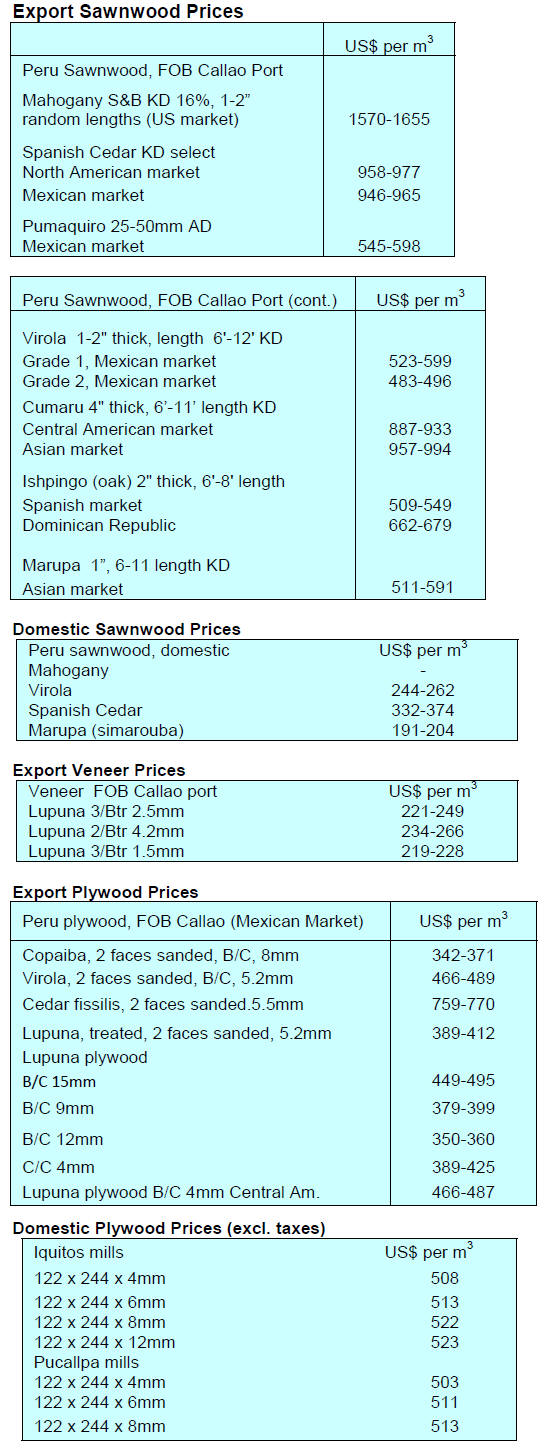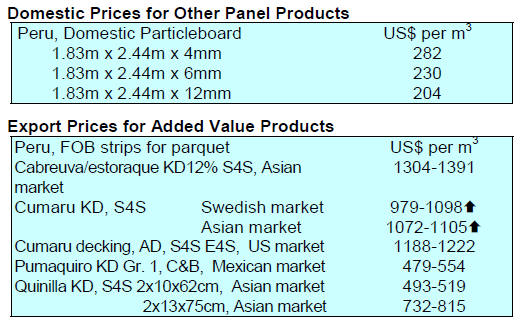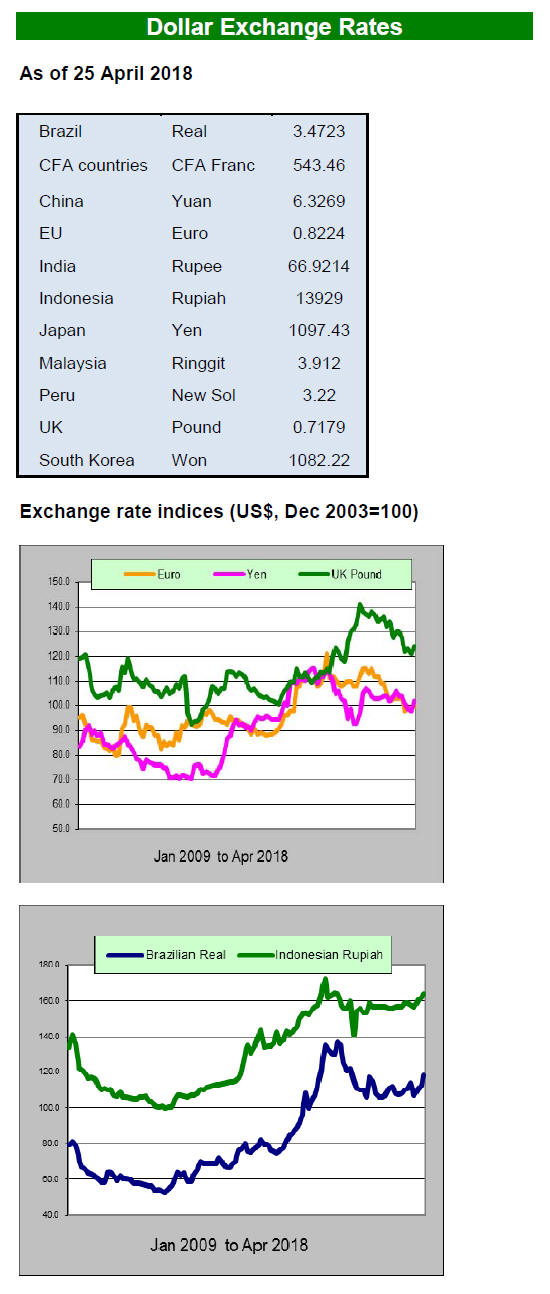2. GHANA
Timber Validation Committee inaugurated
A Timber Validation Committee has been inaugurated by
the Ministry of Lands and Natural Resources (MLNR) to
oversee validation of licenses and other processes in the
forestry sector. The Deputy Minister, Benito Owusu-Bio,
instructed members of the committee to uphold the
principle of good governance as enshrined in the Forest
and Wildlife Policy.
The committee was tasked with enforcing regulations and
ensuring transparency in the implementation of the Timber
Resources Management and Legality Licensing
Regulations through safeguarding the principles of
transparency, credibility and independence in the
operation of the country’s Legality Assurance System.
The Deputy Minister was emphatic that the root cause of
illegal logging in the country could be traced to weak law
enforcement, inadequate monitoring and coordination. It
was for this reason that the committee was established to
address the existing inadequacies and enforce the legal and
policy framework to deal with illegality in the forestry
sector.
Ghana endorses the Africa Free Trade Agreement
Ghana has endorsed the African Continental Free Trade
Agreement (ACTFA). The aims of the agreement are to:
• Create a single continental market for goods and
services, with free movement of business persons and
investments and thus pave the way for accelerating the
establishment of the Continental Customs Union and the
African customs union.
• Expand intra African trade through better harmoniszation
and coordination of trade liberalisation and facilitation
regimes and instruments.
• Resolve the challenges of multiple and overlapping
memberships and expedite the regional and continental
integration processes.
• Enhance competitiveness at the industry and enterprise
level through exploiting opportunities for scale production,
continental market access and better allocation of
resources.
See: https://au.int/en/ti/cfta/abou
and
https://au.int/en/pressreleases/20180321/list-african-countriessigned-
establishment-african-continental-free-trade
Many in the private sector in Ghana have expressed
concern that the increased competition from FTA
participants could undermine local manufacturing but the
Minister of Trade and Industry, Allan Keremanten, is
optimistic that a zero tariff market beyond ECOWAS will
be an advantage. Ghana is considering hosting the ACTFA
Secretariat.
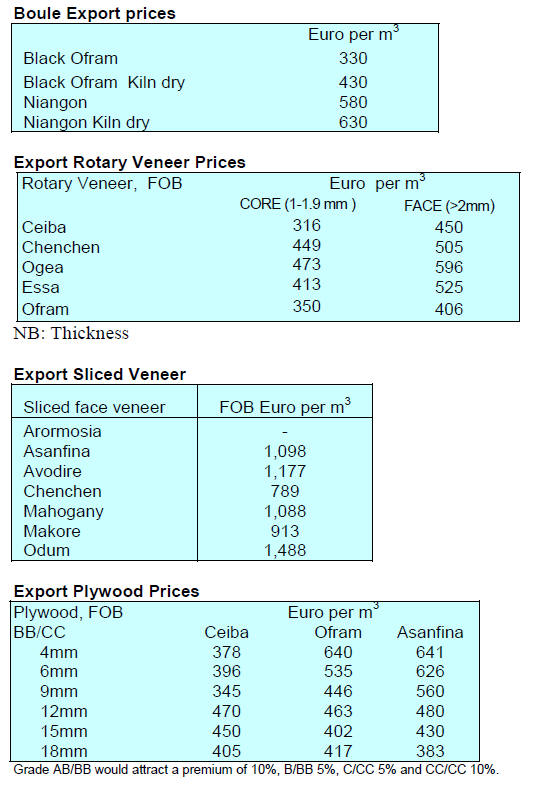
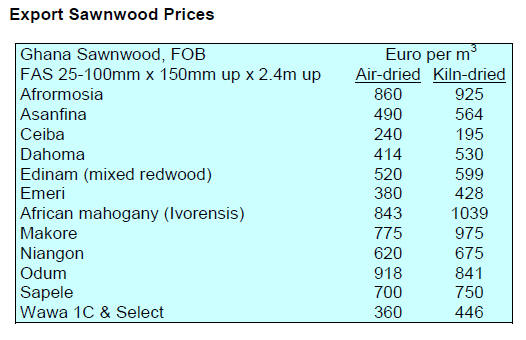
3.
MALAYSIA
Furniture exports to 180 countries
2017 was a tough year for the Malaysian furniture
manufacturers and exporters with persistent issues and
challenges relating to production, material supply, red tape
and soft global demand for furniture. However, the
Malaysian furniture industry persevered and furniture
exports in 2017 exceeded RM10 billion.
According to the official trade statistics from the Ministry
of International Trade and Industry, Malaysian furniture
exports grew by 6.4% last year, a stronger pace compared
to the 4.2% in 2016, to record RM10.1 billion of furniture
exports to over 180 countries.
As a net exporter of furniture, Malaysia remains in the list
of top 10 furniture exporters in the world according to the
CSIL Centre for Industrial Studies.
However, the Malaysia Furniture Council (MFC) has
pointed out the challenges to sector growth which include:
 the availability of sawn rubberwood
the availability of sawn rubberwood
 the Malaysian Timber Export Board (MTIB)
the Malaysian Timber Export Board (MTIB)
export license requirement on furniture exports,
 the continued export of rubberwood veneer and
the continued export of rubberwood veneer and
finger-jointed sawnwood
 the availability of foreign labour
the availability of foreign labour
The Ministry of Plantation Industries and Commodities
recently announced the following to support furniture
manufacturers:
 a moratorium on sawn rubberwood exports
a moratorium on sawn rubberwood exports
 continued deferment of the MTIB export license
continued deferment of the MTIB export license
requirement for furniture
 review of levy on veneer and finger jointed
review of levy on veneer and finger jointed
sawwood
 review of the foreign worker levy and minimum
review of the foreign worker levy and minimum
wage rates
The MFC has confidence that the RM10 billion furniture
export target as determined in the National Timber
Industry Policy can be achieved.
5 year contract for container flooring
The domestic media in Malaysia has reported that Sabah
based Sinora has secured a five year contract to supply
container flooring to a Chinese enterprise, Foshan
Zhengsen. To meet this contract Sinora will expand its
container flooring production line.
Ramin and Gharu quota
For 2018, the export quota for Ramin products
(Gonystylus spp.) which includes parts and derivatives has
been fixed at 10,000 cubic metres. The export quota for
Karas/Gaharu (Aquilaria spp.) products which includes
wood chips, wood blocks and essential oils is fixed at
150,000 kg for 2018. All exporters of Ramin and
Karas/Gaharu products must secure export permits from
MTIB.
‘High income’ status by 2020
The World Bank has said Malaysia’s export growth is
likely to be sustained in the first half of this year in line
with the rise in global trade and that 2018 economic
growth could top 5.4%, dipping to around 5% in 2019
because of the high level of household and public debt.
The Bank anticipates that Malaysia could achieve ‘highincome’
status between 2020 and 2024 but to achieve this
there is a need to address structural reforms. A highincome
economy is defined by the World Bank as one
where income per citizen is US$12,476 a year or more.
Early April plywood prices
Plywood traders based in Sarawak reported the following
export prices:
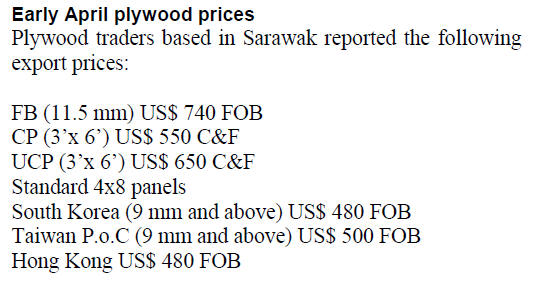
4.
INDONESIA
Furniture makers consider
increasing timber imports
The Association of Indonesian Furniture and Handicraft
Industry (HIMKI) has raised questions on the management
of the timber trading system. Abdul Sobur, Secretary
General of HIMKI said that the availability of domestic
timber is declining and that prices are rising as a result.
Sobur commented that furniture makers are now
considering increasing raw material imports which
currently run to around 25% of sector consumption.
Furniture exports could benefit from US/China trade
dispute
The trade dispute between the US and China is providing
business opportunities for furniture producers according to
Wang Sutrisno, Director of the Indonesian company,
WOOD.
Wang commented that China accounts for almost 50% of
US wooden furniture imports while Indonesia, until
recently, could only secure a 3% share. Indonesia’s share
of US imports is set to rise, said Wang, as buyers in the
US look for alternative suppliers.
10 million Indonesians depend on the forest
The Ministry of Environment and Forestry has reported
that around 70% of rural inhabitants still depend to some
extent on the natural resources in forests. The Ministry
estimates that some 35,000 villages are impacted and that
some 10 million people in the country are assessed as poor
and have no legal rights to resources from the forest.
Siti Nurbaya, Minister for Environment and Forestry, said
in an official statement that data from the Ministry
indicates that the past policy of forest management permits
is oriented to the timber private sector.
Data shows that 42 mil. ha. of state forest are subject to
management permits but that only 4% of these are for
community utilisation. To correct this the Ministry has
established a social forestry programme through which
permits are granted directly to communities. This
programme involving communities has become one of the
Presidents priorities.
Indonesian furniture gaining recognition in
international markets
Twenty-seven Indonesian designers attended the furniture
and interior design exhibition ‘Salone Internazionale del
Mobile’ in Milan between 17-22 April. The conclusion
drawn from the event was that Indonesian furniture
products and designs are increasingly gaining recognition
in international markets and have a firm standing in Italy
where there are several Indonesian furniture showrooms as
well as online furniture sales businesses managed by
Italian companies.
Aries Asriadi, from the Indonesian Embassy in Rome,
commented that Indonesia furniture makers need to
continue to promote products with high added value attract
Italian buyers.
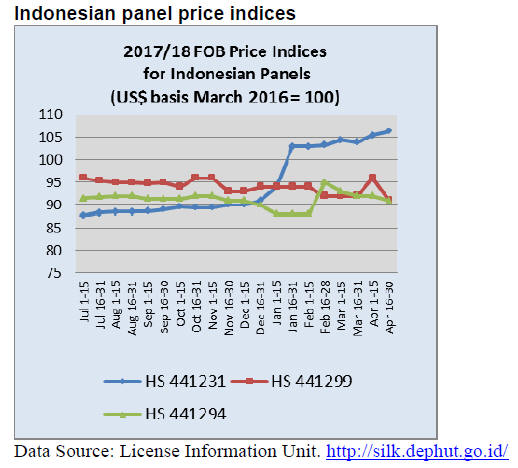
5.
MYANMAR
Regional forestry training centre for
Myanmar
The Asian Forest Cooperation Organization has been
officially launched. This is an intergovernmental regional
organization with the aim of strengthening regional forest
cooperation to address the impact of climate change. The
member nations are Korea, Bhutan, Brunei, Cambodia,
Indonesia, Kazakhstan, Laos, Mongolia, Myanmar,
Philippines, Singapore, Thailand, Timor-Leste and
Vietnam.
The Organization has been promised almost US$24
million for projects to 2023. A sum of US$16.6 million is
earmarked for programmes that include a regional
education and training centre in Myanmar, development of
education and training programmes, establishment of a
forest genetics research centre for restoration of major
timber species in Cambodia, rehabilitation and
development of the mangrove forest ecosystem in the Binh
Province, Vietnam and village-based forest rehabilitation
in Laos.
See:
http://www.koreaherald.com/view.php?ud=20180423000430
Logs seized in Bago Mountains
The domestic press has quoted the Ministry of Natural
Resources and Environmental Conservation as saying over
5,000 tons of illegally harvested timber had been seized
and suspects held in Bago Region in the southern central
part of the country. There has been a total logging ban in
the Bago Mountain Range since 2016. Of the total seized,
2,266 tons was teak.
The State Minister for Forestry in the Bago Region has
been relieved of duty but the information from the
Ministry does not link the illegal felling and the removal
from office of the official.
The authorities in Myanmar have cracked down on illegal
logging and in his mid-April New Year (Thingyan)
address, Minister Ohn Win mentioned that the Community
Monitoring and Reporting System ( CMRS) will be used
to assist combating forest crime.
No to foreign investments utilising natural forest logs
Last year the Myanmar Investment Commission (MIC)
suspended approvals of foreign investment in the forestry
sector if the business plan involved utilisation of logs from
the country’s natural forest.
Last year investment approvals fell for the second
consecutive year, underscoring the challenges the
government faces in keeping up the momentum of capital
inflows. Despite the decline in international investment
domestic investments topped US$12 billion in 2017
according to the MIC.
The Thilawa Special Economic Zone attracted
around US$400 million last fiscal year. The zone on the
outskirts of Yangon is being developed jointly by Japan
and Myanmar.
No log sales in April
Due to the Thingyan celebrations there were no log tender
sales in April.
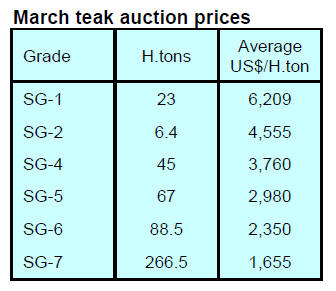
6. INDIA
Surge in veneer prices lifts wood
products index
India’s official wholesale price index for all commodities
(Base: 2011-12=100) for March 2018 released by the
Office of the Economic Adviser to the government (OEA)
rose by 0.2 percent to 116.0 (provisional) from 115.8
(provisional) for the previous month.
The annual rate of inflation, based on monthly WPI in
March 2018 was 2.47% compared to 2.48% (provisional)
for the previous month. The overall index for wood
products and cork group rose by 0.6% to 131.7 due to the
higher prices for laminated wood, veneer sheets and wood
panels. However, the price of wooden boxes/crates
declined.
The press release from the Ministry of Commerce and Industry
can be found at: http://eaindustry.nic.in/cmonthly.pdf
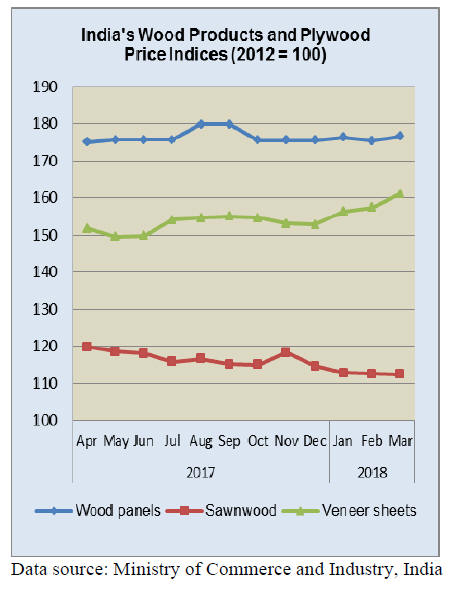
Firm expansion of industrial production
Industrial production in India expanded almost 2% in
February on the back of robust manufacturing and good
sales of consumer durables. The other positive news is that
retail inflation slowed for the fourth consecutive month in
March supporting the view that the Indian economy may
be on a sustained recovery path.
The Reserve Bank of India has lowered its inflation
forecast for 2018-19 to 4.7%-5.1% in the first half and
4.4% in the second half.
Discussions continue on forest policy revision
Discussions on the draft revision of the national forest
policy continue. The draft proposes a ‘green’ cess to
promote “ecologically responsible behavior” and says
greater use of wood products has the potential to create
employment opportunities by boosting indigenous
manufacturing using domestic resources.
The draft policy is open for public comments until the
June 30 and the Ministry is emphasising that the country
needs to change its mind set from forests to landscapes,
from canopy cover to healthy ecosystems, from
substituting wood to promoting sustainable wood use,
from participatory approaches to empowerment and to
greater community participation.
India has set an ambitious target of bringing 30% of its
geographical area under forest cover within a decade
(from the current 25%) and recommends that this be
achieved by rehabilitating degraded land with native
species.
Traders still cannot get adequate bank credit to
sustain imports
Demand for imported logs is stable and there are no
reports of changes in C&F prices. The pace of plantation
teak imports continues to be impacted by the withdrawal
of credit facilities offered to importers due to the recent
financial scams at Indian Banks. With limited working
capital importers have had to cut back on purchases.
Analysts write “efforts to return to normal practices
continue but it seems this will take some longer time to
settle”.
From recent import data it appears that shippers in Brazil
and Ghana are offering larger volumes than was common.

Locally sawn hardwood prices
Prices for domestically milled imported hardwoods
continue unchanged.
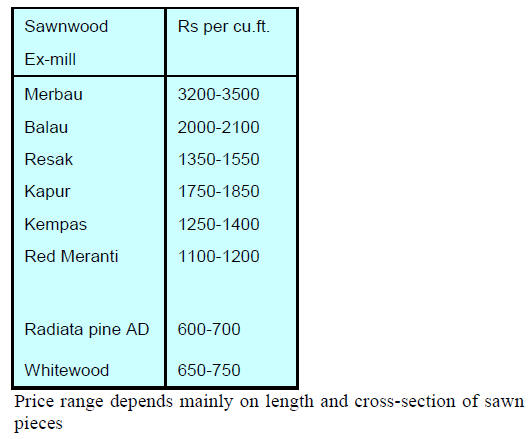
Imported sawn Myanmar teak
Prices for imported Myanmar teak remain unchanged.
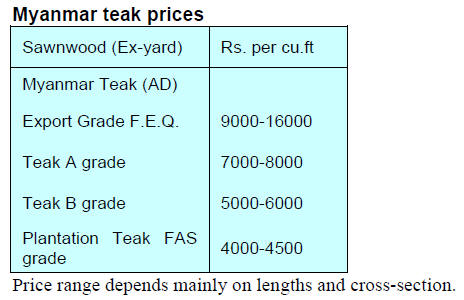
Prices for imported sawnwood
Prices for imported sawnwood (KD 12%) ex-warehouse
remain unchanged.
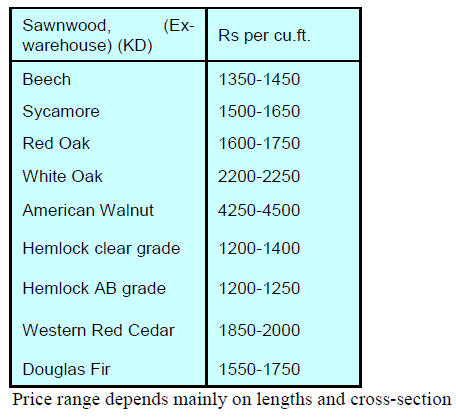
Structure of plywood sector changing
Competition from composite panels is increasing as new
mills come on line. Plywood manufacturers complain that
the GST (sales tax) for composite panels is 18% as against
28% for plywood panels.
Adding to the problems for plywood manufacturers is the
rising price for peeler logs, this, and the expected increase
in resin and other chemical costs, signals a further
plywood price increase may be imminent.
The application of a national Goods and Services tax
(GST) is impacting the structure of plywood
manufacturing in India with the share of production
between the ‘organised’ and ‘unorganised’ sectors
narrowing from 25:75 to around 50:50 at present.
Current domestic plywood prices are shown below.
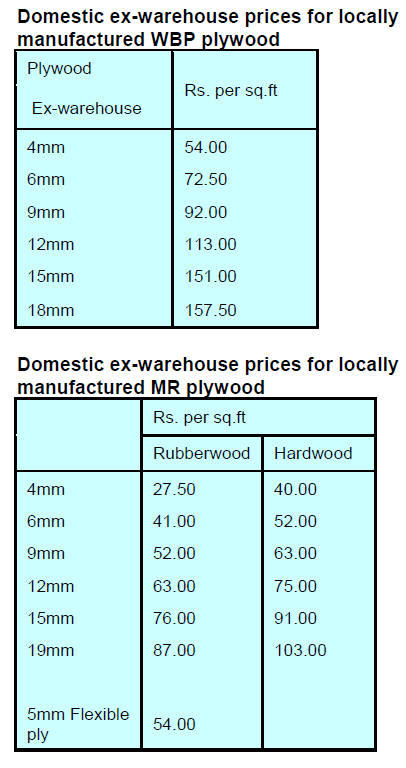
7. BRAZIL
Improved domestic furniture
sales
February domestic furniture sales expanded almost 2% in
comparison with February 2017 building on the modest
growth recorded in January.
The best performance came from traders in Espírito Santo
(42.7%), Pernambuco (26.4%), Distrito Federal (19.0%),
and Goiás (17.5%). In contrast, of the 12 states surveyed,
five reported negative results: São Paulo (-9.2%), Ceará
(-2.7%), Bahia (-2.6%), Paraná (-2.0%) and Minas Gerais
(-.9%).
Amazon Fund promotes recovery in the Amazon
The Amazon Fund will make available around R$200
million for projects focused on increasing the forest cover
in the Amazon.
With the support of the Ministry of the Environment
(MMA) and the Brazilian Forest Service (SFB) the Fund
has started a series of workshops on forest recovery. The
first workshop took place on 10 April in Porto Velho,
Rondônia. The objective was to guide participants on
preparing project proposals in support of the National Plan
for Native Vegetation Recovery (PLANAVEG).
Export update
In March 2018, Brazilian exports of wood-based products
(except pulp and paper) increased 19% in value compared
to March 2017, from US$226.6 million to US$270.4
million.
The value of pine sawnwood exports increased 13%
between March 2017 (US$39.2 million) and March 2018
(US$44.3 million) while in terms of volume there was an
almost 9% increase from 193,400 cu.m to 210,600 cu.m.
Tropical sawnwood exports also increased in March rising
10% from 34,600 cu.m in March 2017 to 38,100 cu.m in
March 2018. The value of March tropical sawnwood
exports increased 14% from US$15.3 million to US$17.5
million year on year.
There was a sharp rise in the value of year on year pine
plywood exports in March (+49%) in value in March.
Exports increased from US$43 million to US$64 million
year on year. The 22% increase in the volume of pine
plywood exports underlines the steady rise in prices.
Exports increased from 159,300 cu.m to 194,600 cu.m
year on year.
Brazil’s tropical plywood, exports are modest but in
March export volumes and values rose; from 13,900 cu.m
(US$5.4 million) in March 2017 to 16,600 cu.m (US$7.1
million) in March 2018.
An almost 6% increase in the value of wooden furniture
exports was recorded in March this year. Exports rose
from US$42 million in March 2017 to US$ 44 million in
March this year.
Export of panels grows
According to Indústria Brasileira de Árvores (Ibá), wood
panel exports in the first two months of 2018 totalled
192,000 cu.m, an almost 10% increase compared to the
same period last year,.
Markets in Latin America accounted for more than half of
the volume exported in January and February, up 14%
over the first two months of 2017. The second largest
market for Brazilian wood panels was the US at US$11
million (up 38%).
In the first two months of this year the domestic market for
wood panels expanded over 6% to 1.1 million cubic
metres.
New IBAMA control system
Last year the Brazilian Institute of Environment and
Renewable Natural Resources (IBAMA) launched the
National Forest Products Control System (SINAFLOR),
SINAFLOR is a system that integrates existing platforms
used by IBAMA for forest control, such as the Document
of Forest Origin (DOF), the Annual Operational Plan
(POA) and the National Rural Environmental Registry
System (SICAR).
The objective is to improve the level of control of the
origin of forest products from logging permits to
transportation, storage, processing and export. The system
aims to increase the degree of reliability to meet
international demands regarding the origin of legal timber.
All states in the country have until May this year to issue
logging permits and document commercialisation of forest
products.
IBAMA says the SINAFLOR system will significantly
reduce the possibility of fraud by bringing more
operational security to the issuance of logging permits, key
elements in achieving two objectives of the Brazilian
Coalition, to curb illegality in the timber sector and to
increase the area of sustainable forest management and
tracked area in the country to 25 million hectares by 2030.
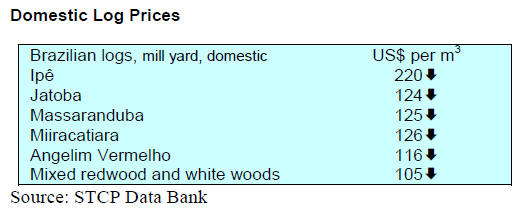
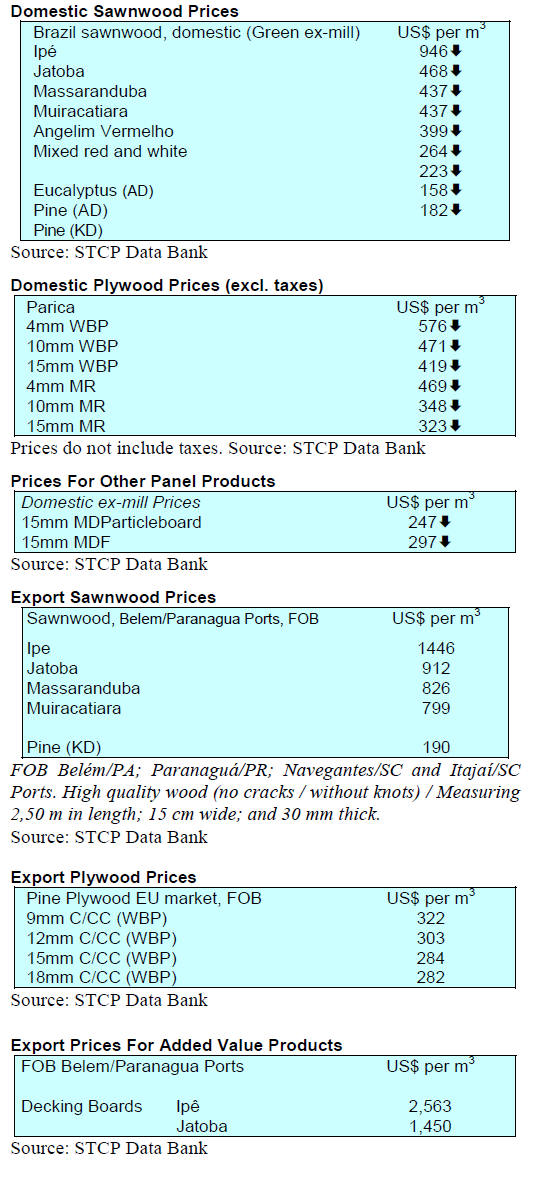
8. PERU
Osinfor aims for ISO standard
The Forestry and Wildlife Resources Oversight Agency
(Osinfor) has initiated a process for adopting international
management standards with the support of the German
development cooperation agency, GIZ.
If this is successful then Osinfor could become accredited
under the international management standard ISO 9001
and ISO 27001. This would mean Osinfor would become
the first public institution in the forestry sector in Peru to
acquire ISO accreditation.
ISO accreditation will help boost confidence in the
information that the Osinfor makes available through its
General Information System and its Geographical
Information System both of which contribute to addressing
illegal logging.
Conclusion of mission to Milan Fair
A group of forestry entrepreneurs, together with the
company specializing in commercial and technology
missions, ‘Tropical Forest’, visited the Milan Furniture
Fair from April 17 to 22.
The group was made up of diverse timber exporters from
around the country. Dialogue was conducted with
European importers and suppliers of technology.
Other mission planned for this year include Technological
Mission to Xylexpo of Milan - May 8-12, Technological
Mission to IWF USA fair - August 22-25, Business
Mission to Furniture China fair - September 11-14 and
Technological Mission to Exposicam Italy - October 16-
19.
Ministers gather for 2020 Initiative
Agriculture and Forestry Minister from Argentina,
Colombia, Belize, El Salvador, Nicaragua, Honduras and
Peru recently gathered for the Fourth Annual Meeting of
the ‘2020 Initiative’. The aim of this initiative is to control
deforestation and further develop the forestry and wood
processing sectors.
Peru’s Minister of Agriculture said "In order not to
continue degrading the lands and deforesting them, we
propose alternatives to cocoa or coffee crops in
ecologically sustainable and profitable mixed activities,
rather than subsistence agriculture”, This was supported
by the Ministry of the Environment whose intention is to
fight deforestation.
The ‘2020 Initiative’ was conceived at the Lima Climate
Change conference and is in support of the goals of the
Bonn Challenge and the New York Declaration on Forests.
